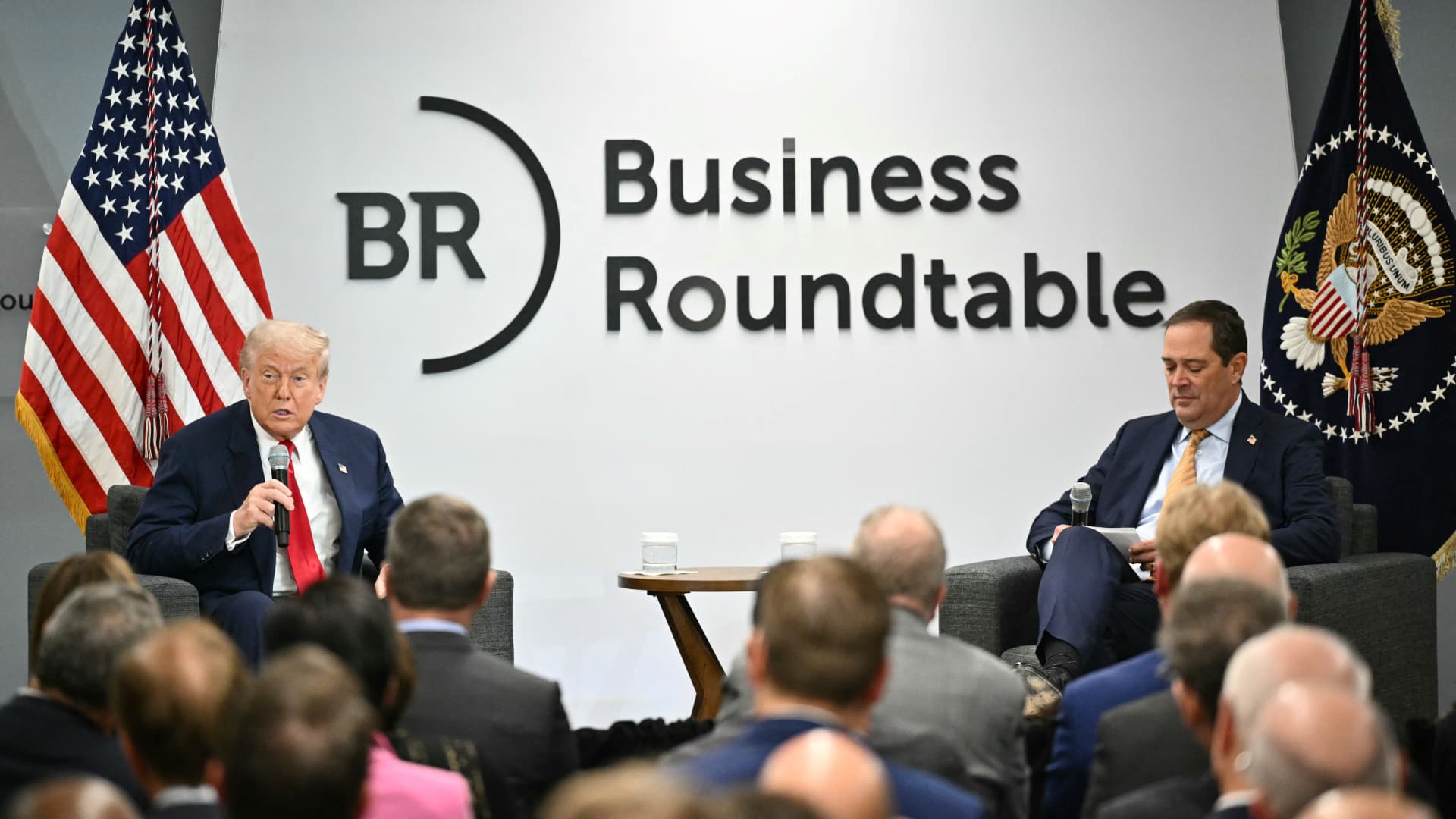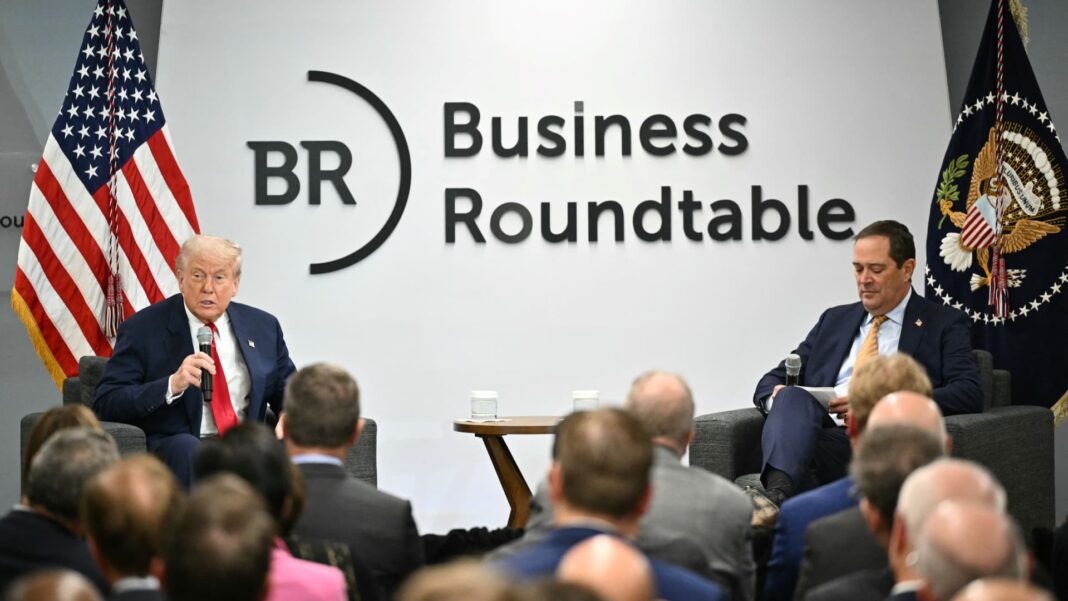The Dow is plummeting. Volatility grips Wall Street. And amidst the economic storm, President Trump is convening his usual gathering of corporate titans at the Business Roundtable.

Is this a reassuring display of leadership, a chance to calm the markets and restore confidence? Or is it a desperate attempt to salvage his own political fortunes as the economy falters under his watch?

The Market’s Reaction: A Growing Fear of a Trade War
Breakdown of the Market Volatility
The recent market sell-off is inextricably linked to the growing uncertainty surrounding President Trump’s trade policies. Investor confidence has taken a significant hit as Trump’s tariff escalation on goods from China and threats to impose tariffs on other trading partners, including Canada and Mexico, have triggered fears of a full-blown trade war.
The Dow Jones Industrial Average plunged over 700 points on Tuesday, marking its worst single-day point drop since January, before closing down 478 points. The S&P 500 and Nasdaq also experienced significant losses, reflecting a widespread anxiety among investors about the potential economic fallout from escalating trade tensions.
Impact of Uncertainty on Investor Confidence and Business Decisions
This market volatility stems from the inherent uncertainty surrounding Trump’s trade agenda. Businesses are finding it increasingly difficult to plan for the future when the rules of global commerce are constantly shifting. The threat of retaliatory tariffs from trading partners further complicates the situation, creating a climate of fear and instability.
This uncertainty is already having a tangible impact on business decisions. Companies are delaying investments, scaling back hiring plans, and reevaluating global supply chains. The lack of clarity regarding future trade relationships is causing a ripple effect throughout the economy, hindering growth and potentially leading to job losses.
Potential Consequences of Escalating Trade Tensions for the Broader Economy
If trade tensions continue to escalate, the consequences for the broader economy could be severe. A full-blown trade war could trigger a global recession, as businesses grapple with higher costs for imported goods, reduced demand for their products, and increased financial uncertainty.
The World Trade Organization has warned that a global trade war could result in a 20% decline in global trade, leading to a loss of trillions of dollars in economic output. Rising import prices could also fuel inflation, eroding consumer purchasing power and further dampening economic growth.
Beyond the Headlines: Real-World Impacts on Workers and Consumers
How are Tariffs Affecting Specific Industries and the Jobs They Support?
While the stock market’s gyrations grab headlines, the real-world impacts of tariffs are being felt most acutely by workers and consumers in specific industries heavily reliant on international trade.
For example, the manufacturing sector has been hit hard by Trump’s tariffs on Chinese goods. Steel and aluminum tariffs have increased costs for manufacturers, forcing them to either absorb the increased costs or pass them on to consumers in the form of higher prices. This has led to job losses in manufacturing, particularly in industries like automotive and agriculture, which rely heavily on imported components.
Analysis of the Potential for Price Increases on Everyday Goods
Consumers are also feeling the pinch of Trump’s trade policies. As businesses face higher costs for imported goods, they are increasingly passing those costs on to consumers in the form of higher prices for everyday goods. This can have a significant impact on household budgets, particularly for low- and middle-income families who spend a larger proportion of their income on necessities.
The impact of tariffs on consumer prices has already been noticeable. The price of certain goods, such as appliances, furniture, and clothing, has risen in recent months. This trend is likely to continue as tariffs on a wider range of goods take effect.
The Role of Unions in Advocating for Workers Impacted by Trump’s Economic Policies
Unions are playing a critical role in advocating for workers impacted by Trump’s economic policies. They are working to ensure that workers are not disproportionately affected by job losses and wage stagnation caused by tariffs and trade wars. Unions are also pushing for policies that support American workers, such as investments in education and training, infrastructure development, and job creation programs.
For example, the United Auto Workers (UAW) has been outspoken in its opposition to Trump’s trade policies, arguing that they threaten jobs in the auto industry. The UAW has called for a more strategic approach to trade that prioritizes American workers and protects domestic manufacturing.
Conclusion
Trump’s meeting with CEOs at the Business Roundtable, amidst a fresh market sell-off, offers a glimpse into the delicate dance between economic anxieties and political maneuvering. While the president sought to project an image of unwavering stability and confidence, the market’s continued downturn paints a different picture. The article highlights the CEOs’ concerns about the escalating trade war and its ripple effects on businesses, underscoring a growing unease within the very heart of the American economy. The president’s focus on deregulation and tax cuts, while appealing to some, may not be sufficient to quell the market’s fears in the face of such uncertainty.
This meeting, however, is more than just a snapshot of the current economic climate. It serves as a pivotal moment, revealing the potential for discord between the administration’s agenda and the anxieties of the business community. The CEOs’ cautious optimism, coupled with the market’s volatile performance, suggests a fragile equilibrium. The road ahead remains uncertain, with the potential for both cooperation and conflict shaping the future of the American economy.
Will Trump’s promises of economic prosperity translate into tangible results? Or will the growing discord between the White House and the business world further fuel the market’s volatility? Only time will tell, but one thing is clear: the stakes are high, and the decisions made today will have far-reaching consequences for all Americans.
